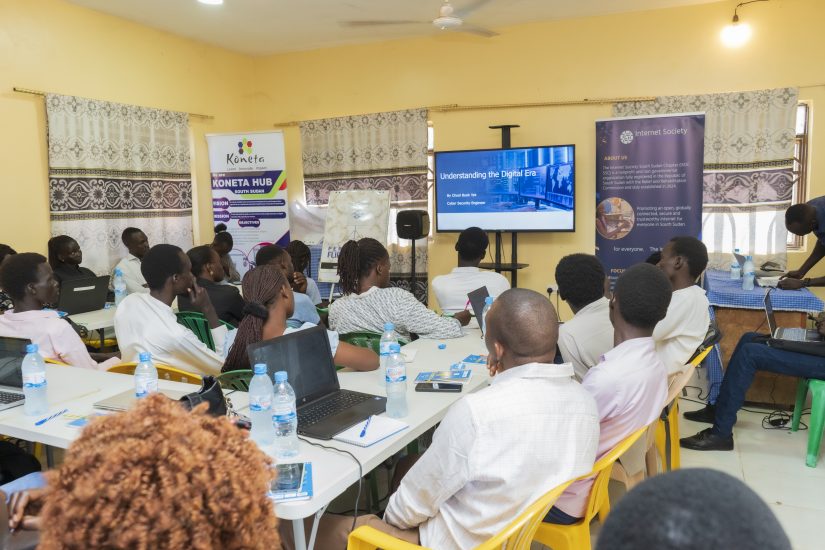
Date: January 29, 2025
On January 22, 2025, the National Communication Authority (NCA) of the Republic of South Sudan issued a directive ordering all internet service providers to block access to all social media platforms—most notably Facebook and TikTok—for 90 days, citing concerns over the spread of graphic and inflammatory content that could incite violence. This directive was issued under Sections 9(g)(f) and 34(6) of the National Communication Act 2012 and was to take effect from midnight.
As the Internet Society South Sudan Chapter (ISOC_SS), a community of technologists, digital rights advocates, and citizens committed to fostering an open, globally connected, secure, and trustworthy internet, we were deeply concerned by this blanket shutdown. While we acknowledge the government’s responsibility to ensure national security and public safety, we believe this goal must be achieved in a way that preserves the digital rights of citizens and does not infringe on freedom of expression, access to information, and economic participation.
Our Official Statement: Advocating for Responsible and Rights-Respecting Measures
In response to the directive, ISOC South Sudan Chapter issued a formal statement on January 23, 2025, addressed to the National Communication Authority (NCA) and other key stakeholders. In the statement, we acknowledged the government’s concerns but stressed the need for a more proportionate and rights-respecting approach to dealing with harmful online content.
Our statement emphasized the following key points:
- The vital role of social media in promoting peace and reconciliation, especially in amplifying the Tumaini Initiative and the 2018 peace agreement.
- The economic impact on youth, small businesses, freelancers, and digital entrepreneurs who depend on platforms like Facebook and TikTok for income and employment.
- The significance of these platforms in civic, cultural, and educational engagement, as used by NGOs, government institutions, artists, and learning centers.
- The risks of long-term harm to South Sudan’s digital economy, innovation ecosystem, and international reputation if such blanket shutdowns become a recurring solution.
- A strong recommendation for the government to adopt targeted measures, such as content moderation strategies, instead of sweeping restrictions.
- A call for the fast-tracking of the Cybersecurity and Cyber crimes Law to provide a robust legal framework for addressing online threats without infringing on digital freedoms.
We reaffirmed ISOC’s commitment to working with all stakeholders to promote a balanced, inclusive, and secure internet ecosystem in South Sudan.
Positive Steps: The Lifting of the Ban
We commend the National Communication Authority for lifting the blockage on January 27, 2025, after announcing that the primary objective—to remove inflammatory and graphic content—had been successfully achieved.
The NCA’s letter calls for:
- Increased collaboration between telecom operators and platform owners (Meta, TikTok),
- Active monitoring and reporting of harmful content,
- And the adoption of a consolidated, multi-stakeholder approach to prevent future shutdowns.
We appreciate this willingness to re-engage stakeholders and pursue a more measured approach to content moderation and public safety.
Our Recommendations Moving Forward
As we look ahead, ISOC South Sudan recommends the following:
- Governments should consider targeted solutions (e.g., content removal, account suspensions, or geofencing tools) rather than sweeping platform bans. Blanket shutdowns are disproportionate and affect all users—including those who use the platforms responsibly.
- We urge the government and the Transitional National Legislative Assembly to fast-track the enactment of the Cybersecurity and Cyber crimes Law.
- ISOC South Sudan Chapter stands ready to work with the NCA, civil society, telecom companies, international partners, and platform owners to develop policies and tools that uphold both public safety and fundamental rights.
- We believe in the power of education. Promoting media literacy, online safety awareness, and responsible content sharing can help build a more resilient and informed online community—reducing the spread of misinformation and harmful content organically.
Conclusion
The temporary ban on Facebook and TikTok has sparked critical discussions about digital governance, public safety, and fundamental freedoms in South Sudan. It is a reminder that access to the internet is not just a convenience—it is a lifeline for education, business, peace building, and personal connection.
We, at the Internet Society South Sudan Chapter, remain committed to advocating for an open, secure, and inclusive Internet for all. We are ready to contribute to national dialogue and collaborate with stakeholders to build a digital environment that supports peace, economic growth, and human rights.
If you would like to learn more, please read the following documents.
